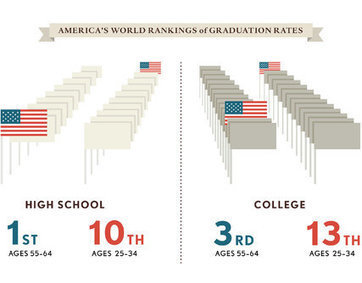 Your new post is loading...
 Your new post is loading...
"Republicans are systematically dismantling the state’s reputation for progress and tolerance." "...[North Carolina] state government has become a demolition derby, tearing down years of progress in public education, tax policy, racial equality in the courtroom and access to the ballot." "[North Carolina will cut] federal unemployment benefits for 70,000 residents. Another 100,000 will lose their checks in a few months. Those still receiving benefits will find that they have been cut by a third, to a maximum of $350 weekly from $535, and the length of time they can receive benefits has been slashed from 26 weeks to as few as 12 weeks." "Though North Carolina has been growing rapidly, it is spending less on schools now than it did in 2007, ranking 46th in the nation in per-capita education dollars. Teacher pay is falling, 10,000 prekindergarten slots are scheduled to be removed, and even services to disabled children are being chopped." "...lawmakers proposed ending extra pay for teachers with master’s degrees, cutting teacher assistants and removing limits on class sizes." "Republicans repealed the Racial Justice Act, a 2009 law that was the first in the country to give death-row inmates a chance to prove they were victims of discrimination. They have refused to expand Medicaid and want to cut income taxes for the rich while raising sales taxes on everyone else. The Senate passed a bill that would close most of the state’s abortion clinics." "... the Legislature is rushing to impose voter ID requirements and cut back on early voting and Sunday voting, which have been popular among Democratic voters. One particularly transparent move would end a tax deduction for dependents if students vote at college instead of their hometowns..."
"[Watch this edition of Frontline as] Bill Moyers chronicles the lives of two ordinary families –one black, one white — for more than 20 years as they battle to keep from sliding into poverty."
"On the 150th anniversary of the Battle of Gettysburg, letters written by soldiers recall the profundities of loyalty and sacrifice." "It’s not just love of country that impels him, but a feeling of indebtedness to the past: 'I know how strongly American Civilization now leans upon the triumph of the Government, and how great a debt we owe to those who went before us through the blood and suffering of the Revolution. And I am willing — perfectly willing — to lay down all my joys in this life, to help maintain this Government, and to pay that debt.' These letter writers, and many of the men at Gettysburg, were not just different than most of us today because their language was more high flown and earnest. There was probably also a greater covenantal consciousness, a belief that they were born in a state of indebtedness to an ongoing project, and they would inevitably be called upon to pay these debts, to come square with the country, even at the cost of their lives. Makes today’s special interest politics look kind of pathetic."
"Maternity care and childbirth cost far more in the United States than in other developed countries, but studies show that their citizens do not have less access to care during pregnancy than America." "Only in the United States is pregnancy generally billed item by item, a practice that has spiraled in the past decade, doctors say. No item is too small. Charges that 20 years ago were lumped together and covered under the general hospital fee are now broken out, leading to more bills and inflated costs. There are separate fees for the delivery room, the birthing tub and each night in a semiprivate hospital room, typically thousands of dollars. Even removing the placenta can be coded as a separate charge. Each new test is a new source of revenue, from the hundreds of dollars billed for the simple blood typing required before each delivery to the $20 or so for the splash of gentian violet used as a disinfectant on the umbilical cord (Walgreens’ price per bottle: $2.59). Obstetricians, who used to do routine tests like ultrasounds in their office as part of their flat fee, now charge for the service or farm out such testing to radiologists, whose rates are far higher. Add up the bills, and the total is startling. 'We’ve created incentives that encourage more expensive care, rather than care that is good for the mother,' said Maureen Corry, the executive director of Childbirth Connection. In almost all other developed countries, hospitals and doctors receive a flat fee for the care of an expectant mother, and while there are guidelines, women have a broad array of choices. 'There are no bills, and a hospital doesn’t get paid for doing specific things,' said Charlotte Overgaard, an assistant professor of public health at Aalborg University in Denmark. 'If a woman wants acupuncture, an epidural or birth in water, that’s what she’ll get.'"
There’s a fluid, hybrid New America before us. What is this really going to look like? What does it mean?
"To regain our lead in educational achievement, we’ll have to work from the bottom up." "Averages can be misleading. The familiar, one-dimensional story told about American education is that it was once the best system in the world but that now it’s headed down the drain, with piles of money thrown down after it. The truth is that there are two very different education stories in America. The children of the wealthiest 10 percent or so do receive some of the best education in the world, and the quality keeps getting better. For most everyone else, this is not the case. America’s average standing in global education rankings has tumbled not because everyone is falling, but because of the country’s deep, still-widening achievement gap between socioeconomic groups. And while America does spend plenty on education, it funnels a disproportionate share into educating wealthier students, worsening that gap. The majority of other advanced countries do things differently, at least at the K-12 level, tilting resources in favor of poorer students."
The premise that greater government involvement in health care spells disaster isn’t borne out in Sweden, health economists there say.
In a 7-to-2 ruling Monday, the Supreme Court said an Arizona law requiring prospective voters to give proof of their citizenship was displaced by legislation at the federal level.
Some say Obamacare is cheap in California. Others say it's raising premiums by 146 percent. Who's right?
"In 'The Unwinding: An Inner History of the New America,' George Packer weaves stories of people large and small to illustrate a superpower fraying at the seams." "Among this book’s few heroes is Ms. Warren, the former Harvard Law School professor and bankruptcy expert who is now the senior United States Senator from Massachusetts. 'The Unwinding' is largely about how banks have become unchecked and unholy forces in American life, and part of what Mr. Packer likes about Ms. Warren, a Democrat, is that banks fear her. His book specializes in plain talk, and in Ms. Warren he spies a rare politician with a gift for the same quality. Mr. Packer describes one of her appearances about banking this way: 'She seemed to have walked into the hearing room and taken her seat at the dais out of the past, from the era when the American prairie raised angry and eloquent champions of the common people, William Jennings Bryan and Robert La Follette, George Norris and Hubert Humphrey. Her very presence made insiders uneasy because it reminded them of the cozy corruption that had become the normal way of doing business around Capitol Hill. And that was unforgivable.' At one point in 'The Unwinding' we meet a talented reporter in Florida who is writing about the foreclosure mess. This reporter, we read, 'believed that there were two kinds of journalists — the ones who told stories, and the ones who uncovered wrongdoing.' Mr. Packer is both, and he’s written something close to a nonfiction masterpiece."
"Bank lobbyists are not leaving it to lawmakers to draft legislation that softens financial regulations. Instead, the lobbyists are helping to write it themselves. One bill that sailed through the House Financial Services Committee this month — over the objections of the Treasury Department — was essentially Citigroup’s, according to e-mails reviewed by The New York Times. The bill would exempt broad swathes of trades from new regulation. In a sign of Wall Street’s resurgent influence in Washington, Citigroup’s recommendations were reflected in more than 70 lines of the House committee’s 85-line bill. Two crucial paragraphs, prepared by Citigroup in conjunction with other Wall Street banks, were copied nearly word for word. (Lawmakers changed two words to make them plural.) The lobbying campaign shows how, three years after Congress passed the most comprehensive overhaul of regulation since the Depression, Wall Street is finding Washington a friendlier place."
"It's both a fun time of year in high school and a time to reflect. I've had kind of an interesting juxtaposition of a couple of items. We have a couple of students that I know at my school who are graduating and think they want to become teachers (we have a great Teacher Cadet program where they get an opportunity to learn about teaching/learning as well as a mini-student-teaching opportunity). In many ways I think this is great - we must be doing something right if we have bright, amazing students thinking they want to become educators. But the second item gives me pause, so I thought I'd take just a few minutes to share some numbers that I've come across recently."
"When politicians want to turn scandals into metaphors, actual details of wrongdoing or incompetence no longer matter. In fact, the details of the troubles swirling around the White House this week are bluntly contradicting Republicans who want to combine them into a seamless narrative of tyrannical government on the rampage. The Internal Revenue Service, according to an inspector general’s report, was not reacting to political pressure or ideology when it singled out conservative groups for special scrutiny in evaluating requests for tax exemptions. It acted inappropriately because employees couldn’t understand inadequate guidelines. The tragedy in Benghazi, Libya, never a scandal to begin with, has devolved into a turf-protection spat between government agencies, and the e-mail messages Republicans long demanded made clear that there was no White House cover-up. The only example of true government overreach was the seizure of The Associated Press’s telephone records, the latest episode in the Obama administration’s Javert-like obsession with leakers in its midst. Many of the Republicans who have added this action to their metaphor blender were also the ones clamoring the loudest for vigorous investigations of national security leaks."
|
"Here's one of the best things about immigration reform: It's going to make the economy a lot better. This video breaks down exactly how that works—how fixing our broken system will create jobs, boost wages, cut the deficit, and foster innovation. Not enough people are talking about this fact, so watch it, then share it!"
"It’s a central premise of the American dream: If you’re willing to work hard, you’ll be able to make a living and build a better life for your children. - But what if working hard isn’t enough to ensure success — or even the basics of daily life? - In Two American Families, Bill Moyers follows families in Milwaukee for more than two decades as they struggle year after year to stay out of poverty, often working longer days for less pay and fewer benefits. Despite their hard work, they only fell further behind. - They’re not alone. Over the last several decades, middle class families have struggled to keep pace with smaller paychecks, mounting debt and shrinking opportunities for steady work. - How are the Stanleys and Neumanns now? After fighting for living wages for more than 20 years, have they found an economic foothold? Is there still hope for a middle class in the new American economy? - We’ve asked the film’s producers, Tom Casciato and Kathleen Hughes, to join us in a live chat to answer those questions — and take yours. They’ll be joined by Keith Stanley, whose childhood is portrayed in the film and who is now executive director of the Avenues West Association, a Milwaukee nonprofit promoting business and economic development."
"The overwhelming impression in “Two American Families” is not of mistakes but of fierce persistence." "... a new documentary film, 'Two American Families,' ... will air next Tuesday night, July 9th, on the PBS series 'Frontline.' The film, produced by Tom Casciato and Kathleen Hughes (friends of mine), and narrated by Bill Moyers, follows the lives of two families in Milwaukee, the Stanleys and the Neumanns—the former black, the latter white—over the past two decades, starting in 1991. Both come out of the solid working class, and their fates are familiar ones. Jackie Stanley and Tony Neumann had factory jobs at the huge engine maker Briggs & Stratton, while Claude Stanley worked for A. O. Smith, a leading maker of chassis frames. All were union jobs, and all disappeared around 1990 as manufacturing went overseas. That’s when we meet the Stanleys and the Neumanns—just as both families are beginning to sink. The only work the men can find pays half the factory wage, without benefits—Claude waterproofs basements, Tony retrains and works the overnight shift doing light manufacturing. Jackie Stanley tries to sell real estate; Terry Neumann gets into a cosmetics-selling scheme, works at a school cafeteria, then drives a forklift. Without unions to support them, they are all at the mercy of indifferent employers and the harsh vagaries of the post-industrial economy."
Chief Justice John G. Roberts Jr. may work slowly, but he has a long-term strategy for putting his mark on the Supreme Court.
"'While my colleagues and I don’t have the majority here in Washington,” the speaker vowed, “we will continue to pursue our plan.' - Or will they? - Not an hour after those words were uttered, Boehner’s House Republicans dealt him the latest in a series of humiliations. Sixty-two Republicans defied him and voted against the farm bill, defeating a major piece of legislation Boehner had made a test of his leadership by pushing for it publicly and voting for it personally — something speakers only do on the most important bills. - The dispute this time was over food stamps and agricultural subsidies, but the pattern was the same: House leaders lost Democratic support by tilting the bill to satisfy the Republican base, but a group of conservative purists remained upset that the legislation didn’t go far enough. - Much the same dynamic confronts Boehner as the House prepares to take up immigration legislation next month. A similar set of pressures has kept Boehner from negotiating a long-term budget deal with the White House. - In all instances, Boehner faces a choice: His job or his legacy. He can enact landmark compromises, but lose his job in a conservative coup. Or he can keep his job but get nothing much done."
"If Obamacare works, the game will be over for those doomsayers who oppose the most change in American life in a generation’s time." "A friend of mine has an adult child with cancer, a young man just old enough to be beyond the age of coverage under his parents’ health care plan. After nearly killing him, the dreaded Hodgkin’s lymphoma is in remission. But he’s still a pariah in the eyes of the insurance industry, which means they can deny him a policy that might save his life. Not for long. In six months’ time, the heartless practice of refusing to let sick people buy affordable health insurance — private-sector death panels, the most odious kind of American exceptionalism — will be illegal from shore to shore. “I can’t wait for Obamacare,” my friend gushed the other day. And she’s not alone. About one in 10 people with cancer in this country have been denied health coverage. The cartoon version of the Affordable Care Act, that much-loathed government takeover of one-sixth of the economy, is now moving from Beltway gasbags and caricaturists into the hands of consumers. Its fate will be determined by the countless anecdotes of people who will apply the law to their lives."
The justices ruled on Monday that brand-name drug makers could face antitrust charges for paying generic competitors to keep cheaper copies of a drug off the market.
"The US Supreme Court rules police may routinely take DNA cheek swabs from suspects who have been arrested but not yet convicted of a crime."
"The program’s a looming non-disaster!" "Still, here’s what it seems is about to happen: millions of Americans will suddenly gain health coverage, and millions more will feel much more secure knowing that such coverage is available if they lose their jobs or suffer other misfortunes. Only a relative handful of people will be hurt at all. And as contrasts emerge between the experience of states like California that are making the most of the new policy and that of states like Texas whose politicians are doing their best to undermine it, the sheer meanspiritedness of the Obamacare opponents will become ever more obvious. So yes, it does look as if there’s an Obamacare shock coming: the shock of learning that a public program designed to help a lot of people can, strange to say, end up helping a lot of people — especially when government officials actually try to make it work."
"The senator says the Republican bill would turn students into 'profit centers.'" "On Thursday, Sen. Elizabeth Warren (D-Mass.) slammed a Republican student loan bill the House just approved that would allow interest rates on student debt to skyrocket. "The student loan bill passed by House Republicans takes a bad situation and makes it worse," she said in a statement. On July 1, rates for federal student loans called Stafford loans are set to double from the current rate of 3.4 percent to 6.8 percent. The GOP bill, which passed the House on a mostly party-line vote of 221 to 198, would allow interest rates on those loans to rise or fall from year to year with the government's cost of borrowing, ending the system in which rates are fixed by law. Because market rates are low right now, the initial rate for those loans would be about 4.4 percent, but in coming years it could increase up to a cap of 8.5 percent."
"'Who’s going to set interest rates, politicians here or the markets?' asked Representative John Kline, Republican of Minnesota, chairman of the House Committee on Education and the Workforce. The House bill would allow student lending rates to reset each year, based on the interest rate of a 10-year Treasury note, plus 2.5 percentage points for Stafford loans. The Congressional Budget Office projected rates on Stafford loans would rise to 5 percent in 2014 and 7.7 percent in 2023. Under the legislation, Stafford loans would be capped at 8.5 percent, while loans for parents and graduate students would have a 10.5 percent cap. Senate Democrats want to extend the current, subsidized rate for at least two years. The cost to the federal government, several billion dollars, would be covered by closing tax loopholes, said Senator Kirsten Gillibrand, Democrat of New York and one of the Senate bills’ primary sponsors. Ms. Gillibrand would go further, allowing graduates with higher interest-rate loans to refinance at a subsidized 4 percent rate. But President Obama has a different proposal that would fall somewhere between the House and Senate bills. He, too, would set student lending rates each year based on Treasury’s borrowing costs, but those rates would be fixed for the life of the loan, not reset each year. He would also cap student-borrowing costs at 10 percent of a student’s income.
"The I.R.S. and Justice Department scandals disrobe a culture festering in unrestraint and overreach." "We clearly have a values problem in the federal government. We clearly have a few or many agencies where the leaders don’t emphasize that workers need to check themselves, or risk losing what remains of the people’s trust. The rest of us just have to be more wary. For example, I generally support the little behavioral nudges that Cass Sunstein describes in his outstanding book “Simpler” — the subtle policy shifts that induce people to save more, or eat healthier. I’d trust somebody with a minimalist disposition like Sunstein to implement these policies. But I wouldn’t necessarily trust the people at the I.R.S. or Justice Department to implement them. They’d take a nudge and expand it into a shove. And what are we to make of financial regulatory reform and the new health care law? In a culture of unrestraint, will federal regulators use these rule-writing opportunities to expand their reach beyond anything now imagined? People can only have faith in a government that self-restrains, and there’s little evidence of that now."
|



 Your new post is loading...
Your new post is loading...

















